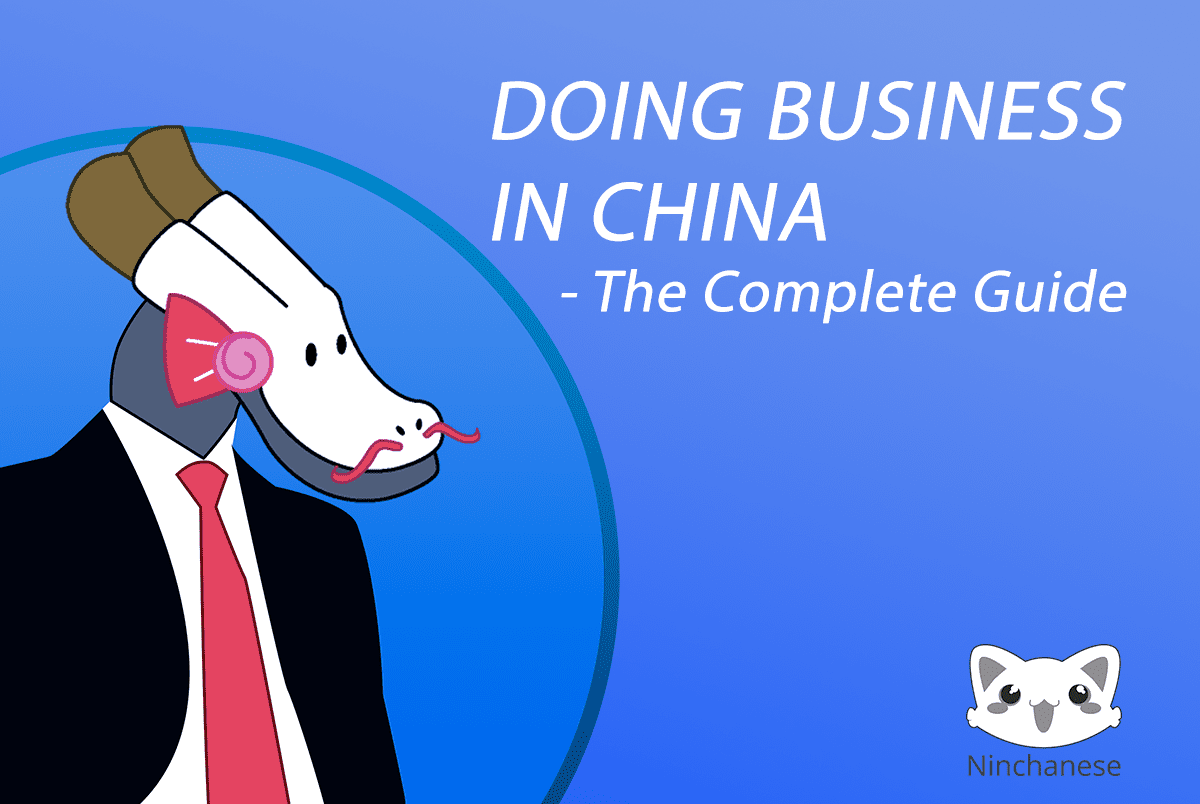China is not that difficult to work with and has pretty enthusiastic people. There are a few rules, you are already doing most of them, but some business practices in China can surprise you. So let’s see how doing business in China works.
In this article, we will explore the best practices to do business in China. We will discuss the importance of the culture, the economy, the government, and finally, we will see the importance of the Chinese people and how it can affect the way we do business.
At Ninchanese, we made a special Chinese business course to follow. You will experiment with doing business in China and learn key concepts to work in China in a Chinese environment successfully. You’ll take your post as a project manager. From there, you’ll see every part of conducting business, from meeting customers to delivering goods. It is one of the best ways to learn how to do business in China, as you can see in the curriculum (and one of the cheapest ways too). And if you want to know more about it before starting this course, you can read the description page of the course Doing Business in China.
The Chinese market is enormous, and there are many ways to do business in China, and also disastrous faux-pas. So we’ll brush up on the state-of-the-art of doing business in China that you’ll be happy to apply directly.
- What is Chinese business etiquette?
- How do I avoid difficulty doing business in China?
- How to get a visa to work in China?
- How to start doing business in China if you’re not in China yet?
- How to get a visa to work in China?
- Do you need a visa to do business in China?
- What are the business advantages of learning Chinese?
- Which language will be the business language of the future?
- Should you approach companies directly or go through an intermediate?
- Free (or not too expensive) ways to approach Chinese companies?
- How to start a conversation with Chinese companies and people?
- When are Chinese companies open?
- How to get dressed for business in China?
- The business card is utterly more important in China than in the West.
- How to use business cards in China during meetings?
- What about bringing a gift to your potential business partner?
- How do Chinese companies conduct meetings in China?
- How to address different people and hierarchies?
- The importance of face
- What does it mean to use your guanxi?
- Are we obliged to go to the restaurant with the Chinese Business Partner?
- Are the Chinese Direct? Are they frank or secretive?
- Should I speak Chinese with Chinese partners?
- What are good manners with Chinese People?
- Should we drink alcohol during business?
- How to avoid drinking too much without losing face?
- Who should pay for the restaurant in China during Business?
- How to continue the conversation after your first meeting?
- How to work with Chinese colleagues?
What is Chinese business etiquette?
The people of China are very different from Western people, I would say boldly. They may look seemingly similar, but they are different, and it’s essential to know the difference and subtilities. They have different views on the world, different cultures (and very ancient), different values, and different ways of doing things. Therefore, it is essential to truly understand the Chinese people and how their business culture can affect the way we do business.
Before going on and doing big things in China, there are a few rules that will lead you to greater success:
- Learn how to use the local Chinese language to communicate with Chinese professionals. (Tip: Use ninchanese.com)
- Take some time to learn and respect the traditional culture, faith, customs, and Chinese history.
- It would be best if you also understood the recent treaties, policies, phenomena, and historical events to familiarize yourself with the latest trends of China.
- Lastly, try to know all your partners, colleagues, clients, and other persons involved in your field of work.
How do I avoid difficulty doing business in China?
If you want to work in China or with China, it’s natural to learn the Chinese language and the Chinese business language because it’s not the same knowledge. When we made our course based on actual present dialogues, we were surprised to see that much of the terminology used in the course is not in the HSK. So learning the language is essential, but it’s especially crucial to understand the business lingo. And more specifically, you’ll have to know the Chinese vocabulary for your field of work (or market). But, still, having a high-level HSK will also great you with a better visa. This can be interesting in the long term, we’ll see more about the visa system later.
Second, read the rest of the article and master Chinese business etiquette because if you do not master either, your attempt to do business in China will fail very soon.
It’s really about knowledge is power, and the environment in China is very complex. So it would help if you won the trust of people before you can do business in China. And you will win their trust partly by knowing and understanding them.
How to get a visa to work in China?
In the situation where you did find a job in China and need to move there, you’ll need a work visa. Well, It’s an important question, but I’m not a visa specialist, so first I recommend you go to the website of the Chinese Embassy of your country. You’ll need to put together some documents before you can apply for a visa and be able to travel to China for business purposes. And then you usually have to go to the Embassy to process your application; then they will tell you to get it when it’s ready. You’ll be granted a level visa.
You can get a B, A, Z, or R visa depending on your profile. For example, to get an A-level Visa, you must get 85 points and for example, having the HSK 5 is the one that will give you the most point (5 points). Having the HSK 6 won’t give you more points. There are quite a few things that will give you points, the age, the salary level, and your Mandarin Skills: here’s a Visa level simulation. But while having a high-level visa is good to get a better level visa in the future, you will be totally fine with a B grade visa to work in China. I highly recommend the blog article of Andy Boreham speaking about his experience on Visa.
Do you need a visa to do business in China?
You don’t need a work visa but a China “M” business visa. M business visas are issued for commercial and trade activities. If you need to go to China for less than 3 months to visit clients, or meeting with business partners, and attend trade fairs, then an M business visa is easier to get and what you need. If you have an American nationality, you may be eligible for a 10-year multiple entry visa.
What are the business advantages of learning Chinese?
The Chinese economy is rapidly developing and is an important global trading partner. The Chinese language has the most significant number of speakers of any language globally, which means that learning Chinese can lead to business opportunities in China. More than 2.3 million Chinese students study English. Still, English speakers have few opportunities to study Chinese, which means that learning Chinese can be a path to future opportunities in business and trade.
Which language will be the business language of the future?
It is not possible to predict this with any certainty. The common language of international business is, at present, English. However, this may be superseded by an Asian language, especially if the influence of the Asian countries continues to grow. The use of English as the language of business has been facilitated by the fact that the countries of the Commonwealth have become important trading partners. However, the same may not be true in the future.
It is possible, even likely, that there will be trading blocks formed in the future, which Asian countries will dominate. If this were to happen, it is most likely that Chinese would become the common language of international business.
How to start doing business in China if you’re not in China yet?
If you are not in China, the most straightforward way to know Chinese companies in your sector is by going to your local commerce chamber. They already have specialists that will help you get connected with Chinese businesses.
Some other private companies, or independent consultants, can also help you get started and get a few meetings. Be sure to define the scope of your activity and what you want to do with them. Be straightforward with the specialist on how you’d like to work with them and your goal in China.
I have used these services, and it’s a fast method to get contacts and meetings with China-based enterprises. But, beware, I’ll say that it’s better to drive well how the specialist works. China has millions of companies, so explain to them what kind of company you want to see as precisely as possible. It will help them identify businesses looking like the one you would like to see. So don’t rest, and continue working alongside them to get the most result out of your trip. A few calls regularly will help you know how things are going. Your time is precious, and you can see only a limited number of enterprises.
Entering the Chinese market is not that difficult. It won’t be hard to organize your business trip with a trustworthy organization, a good product, and a good knowledge of your general market.
Should you approach companies directly or go through an intermediate?
It’s a legit question, and we can be tempted to do it ourselves as we do in our country, but I recommend you go through an intermediate. Why? Because Chinese companies like to get advice from a trusted partner and often favor word of mouth over cold calls. You will also save time identifying companies, and they can get appointments you only have dreamt possible.
Free (or not too expensive) ways to approach Chinese companies?
One great way to make contact is trade fairs. There are many trade fairs in China, and they are huge, with many companies presenting their products. So you’ll find a lot of companies there. And if you introduce yourself to a company in your field and make a good connection with them, there are great chances that they will help you get to the businesses you want to work with.
The Chambers of Commerce often do events with companies involved. You’ll meet other entrepreneurs, but it can also be challenging to find a relevant partner there.
The most well know Fair in China are Canton Fair, Yiwu Trade Fair, Beijing Auto Show, the Bauma Fair, and the Shanghai Import and Export Commodity Fair.
You can also use a professional app like Maimai to connect directly with people, a bit the same way LinkedIn works but for Chinese professionals.
How to start a conversation with Chinese companies and people?
They’ll grace you with a smile. That’s typically how a conversation starts in China. And they expect you to be smiling too. You can then handshake but look attentively at your counterpart to check if they are used to handshakes. It’s common to say hi without any touch in China, and that’s ok, don’t take it personally. And you don’t need to bow, but if they do it, well, you can.
When you address Chinese people, it’s common to start with their titles and follow them by their last names. But, compared to the Western way of naming oneself, keep in mind that it’s the opposite in China: so the surname comes first, followed by the first name.
When are Chinese companies open?
It’s a fundamental question but always good to know. Chinese enterprises are often open from Monday to Friday and start working from 8:00 am to 5:00 pm. It’s pretty normal to have a 2 hours break at noon, so don’t expect to get someone on the phone during these hours or make a reservation for a meeting.
How to get dressed for business in China?
You’ll generally see your interlocutors dress in “smart” apparel in a business meeting in China. You can expect to see classic black suits with a colorful tie for men and a traditional black dress for women. It’s not always true for ladies; if they have a high-level position in the company, they will dress with expensive clothes. So be sure to match your interlocutor’s grade and dress accordingly.
People can dress more relaxed, fashionably, or eccentrically in an innovative space like computer engineering, start-ups, or creative fields like art. But, even if they dress more casually, they do it with style and keep their look professional. So here again, go with the trend and dress like them.
The business card is utterly more important in China than in the West.
When saying hi, you’ll start to exchange business cards rapidly. A business card is vital in China. Imagine the business card as a person. You need to be careful how you present, take, and store the card. For example, it is not very good to put a business card in your back pocket for obvious reasons.
Understand that exchanging business cards is a sport in China, so be sure to have enough on you. If you can have a unique business card only for China, do it and get one side with English and the other side with Mandarin Chinese.
As I said, it’s vital to give your card with (humility) manners and style. Be sure to give your card using two hands with the side in Mandarin Chinese facing up. Let your recipient examine it, and do the same when you receive a card. Take it with two hands, look at it, and store it in a card case. Only glancing at a card and setting it down can be interpreted as a lack of interest.
How to use business cards in China during meetings?
If you did not exchange business cards before, presenting one’s card on the table when the meeting starts is necessary. Then, you push your card along its long axis against another card on the table. You hold it with two hands on both sides of the card. Then you take the other cards and place them next to you, so you don’t forget the names and titles of your interlocutors.
Sometimes your Chinese interlocutors will give you their WeChat account. But sometimes not, and we will speak about it a bit later.
Ok, you’re doing great. Now, let’s get to the meeting!
What about bringing a gift to your potential business partner?
Before going to the meeting, you may think it’s a good idea to bring a gift. It’s a complicated question. A few years ago, it was a good idea, but recently, China started a war against corruption, so it is not acceptable to bring a present anymore. Even if it’s an excellent cultural habit in China, I recommend going easy with gifts and not making it look like a bribe. So if you go with a present, bring something not expensive.
If the business relationship is going well and you know your Chinese partner better, I recommend offering a gift later, like if you meet in a restaurant. Your Chinese partner will see it as proof of your relationship going well. And, if you can make a double gift, it’s even better and a good auspicious.
How do Chinese companies conduct meetings in China?
Don’t fear your meeting with a Chinese company. You’ll be surprised to see how joyful a meeting can start. It’s pretty different than in the West. The first 5 minutes are for small talk! So please don’t be late. This is viewed poorly, as the first minutes are for the critical small talk.
As far as topics go, rest easy. Be it the weather or an anecdote you have to tell, most small talk topics are acceptable. Your host will undoubtedly tell you where to sit and bring you water. You’ll usually find your name on the table, and you’ll be on the opposite side of your interlocutor.
Then after this starter, the meeting goes as we are used to in the West. You can start your presentation, bring your slides, and make a convincing presentation. If you did your presentation right, the Chinese counterpart will tell you how to continue any formality with his assistant. Don’t expect to sign the contract immediately. But if you did well, that’s undoubtedly a perfect moment to exchange your WeChat accounts. Be sure to have one when you arrive in China. That’s how you keep in contact with everyone, even the boss. I think that is a great way to connect with influential people. It’s something we certainly should do more in the West.
Then, when you feel the meeting is ending, you can leave the room. It is expected from you that you leave the room before your mandarin Chinese counterparts.
How to address different people and hierarchies?
The first thing to know then is that you must pay attention to elders and respect hierarchy in every situation. Senior positions enter a room by rank, so take a close look at who enters first and second in the room. Same for you, if you’re the boss, enter first in the space; if you’re not the boss, tell your boss to enter first.
You must acknowledge the place of older people and seniority and be sure to show regard to them.
The importance of face
It’s a question of respect. It is not so far from the idea of a face. For example, restrain yourself from correcting people if they made an error. Just say that it’s a good point and tell them you see things differently if it’s imperative. But bring up things slowly, and be sure to be considerate of how you say something. Take your time, beat around the bush, and let them discover by themselves what’s wrong. And if they don’t, just bring up that point again later, preferably in a more private manner. I know this can take time, but they like to negotiate this way. Chinese see the whole picture as more important than just a detail. And so if the entire concept is good, but they made a little mistake, just let it go and move on.
What does it mean to use your guanxi?
If you give them face and your relation with your partners go well, you’ll make good 关系 guanxi, a good connection. Making connections is pretty crucial for the Chinese. It is what they call 关系 guanxi. Guanxi is a pretty important concept and can open up many doors. So be sure to respect them, so they will trust you to present some people of their guanxi. But, in a way, it’s the same for us. We like to introduce people to partners when they trust and respect you. It’s the same. Let them have their face, they will do the same for you, and you can all do business.
Everything is going well, and you showed them respect as you should. Great chances that you will receive an invitation to a meal, quite possibly directly via your WeChat.
Are we obliged to go to the restaurant with the Chinese Business Partner?
One thing about being invited. I had many meetings in China, and from my experience, you should not believe people who say you need to ask people to restaurants to do business. No, you can do business with them without having a meal. It depends on the context. For example, if you are there to make a big contract, you may likely stay with your partner for some days, like a joint venture, then, yes, they will invite you to have a meal, and you will invite them too. But, on the other hand, if it’s a quick transaction, then you don’t need to.
So then, everything went well, and you invited your Chinese partner to the restaurant. How do you behave?
Are the Chinese Direct? Are they frank or secretive?
So you are invited to a great Chinese restaurant. Don’t take any risk here. Go with the kind of outfit you went to the meetings in. The ambiance will likely be friendly, and that’s where you’ll get asked many questions. Chinese people can be pretty direct and can ask questions we can view as rather intimate. Speaking about money, age, for instance, isn’t taboo in China. So do as you feel about answering these questions. But be sure that you explain that you don’t feel right speaking about this subject politely. If you are not shy and are comfortable sharing such information, then don’t hesitate to answer.
Should I speak Chinese with Chinese partners?
Chinese speakers love it when you speak Chinese, and it can be a great impression to make. But, before going on with your Chinese, be sure to know what you are saying. If you say something wrong, it can be counter-effective. But worry not, if you did your lessons on Ninchanese, you’ll be ok. If you’re ok in Chinese, but it’s still so-so, they will say it’s excellent. Do you remember the face? Perfect example. But if your Chinese is quite good, they sure will adore you and see it as an impressive commitment. So, depending on the Chinese level, be sure to speak Chinese on the right occasion.
What is the best app to learn Mandarin for business?
The best app to learn Mandarin for business will vary depending on your exact desired level of Mandarin. If you are planning to go to China or if you are planning to work with Chinese companies, then the best app to learn Mandarin for business is Ninchanese. Ninchanese is the best app to learn Mandarin for business because it is a complete language learning application. In addition to its business course, it provides a wide range of language courses from beginner to advanced levels. Ninchanese offers courses on grammar, conversation, pronunciation, vocabulary, and cultural course topics. It is completely free to signup or to download, use, and learn from Ninchanese.
What are good manners with Chinese People?
The Chinese will often ask you if you have eaten first. Say that you’re good. They are just being polite. It’s the same as when asked, “how are you doing?” in English. But if you are at the restaurant, then, yes, be happy about it.
Should we drink alcohol during business?
The idea is to get to a friendly environment; your Chinese partner will likely ensure that’s the case for you. For example, Chinese people like to toast. And they will start by raising a toast to your new relationship.
It’s a great time, but there are again some little rules to know here. Chinese don’t drink like you, you individualist drinker. In China, you drink when the toast is finished. You drink all your glass. In one shot, all together. You never drink alone. If you want to drink, you need to make a toast to everyone. Do as your elders do. And be very optimistic here.
When toasting, be mindful of what you were served to drink. For example, a few shots of beer (yes, it’s possible) are not the same as a few shots of Baijiu. Baijiu is fine alcohol, but it’s very strong. So, take it easy with making toasts (because you want to drink); your Chinese counterparts will also make their share of toasts.
How to avoid drinking too much without losing face?
With that in mind, make sure you have eaten a little before or during the toast. The last tip, if you don’t like drinking, tell them you’re sick and have a medical reason for not drinking. It will help in to get by. Don’t tell them that you don’t drink. Also, don’t joke by saying “comrade” (if you’re not part of the communist party) or tell a lame joke about that.
When you are going to eat, they will bring you a tremendous quantity of food. It should be more than enough, so don’t feel like you should finish all the dishes laid out in front of you. Quite the opposite, it’s seen as a good sign if you did not eat it all, they will think that you had enough to eat.
There are many rules about eating, and I won’t enumerate them, but you can read more about Chinese cultural habits here.
Who should pay for the restaurant in China during Business?
Lastly, your host will pay for the meal, and giving tips is generally not a thing in China, so don’t bother with that. If you’re the instigator of the meal and it makes sense in your business relation, you pay for everyone. This might require a little insisting, as your host will insist they are the ones that should pay. But, it’s good business etiquette to do your best to pay for everyone at times.
How to continue the conversation after your first meeting?
In all of China, Chinese companies use Mandarin mandarin Chinese except for Hong Kong and Macau. So they will likely write in Chinese, but they do speak English with an international partner. If you can write the message yourself in Chinese, do, you’ll talk with the person in charge.
The very next day of your meeting, you can send an email to the person the boss told you. Send them a simple email with a resume of the meeting. Tell them you would like to see them again to discuss the last details of the operation. Then, it could be your turn to invite them to a nice restaurant.
You can also do business with WeChat; it depends on how your Chinese counterpart tells you about that. The best is to follow the vibe. But WeChat is a great way to reconnect with your interlocutor. It could be as easy as sending a nice message during the Chinese new year wishing prosperity in your partnership. In general, it’s good Chinese Business etiquette (as well as good common sense) to try to stay in touch and regularly check in with your Chinese partners.
How to work with Chinese colleagues?
Like in the West, establish a good personal rapport between your Chinese colleagues and yourself. Then be considerate of their food and work culture. You should adhere to the local customs (like napping time), obey the company’s rules, cultivate work habits, be patient, and remember that names are important. It’s not always easy, but follow our business course and you’ll do fine.
We wish you good luck with your business. Like I said before, be sure to check out our business course on Ninchanese to know how exactly it happens and be sure to speak impressive Chinese. It takes a few hours to complete and will guarantee you considerable business knowledge. Let us know how it goes for you in China. We love to hear stories from you!
The Nincha Team
Stay in touch with us on Facebook, Twitter, Instagram, and Pinterest.





